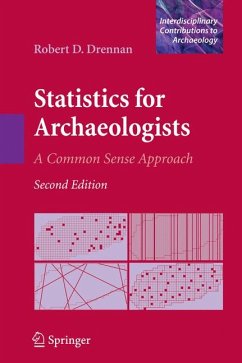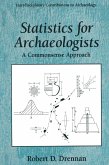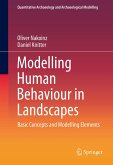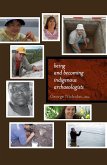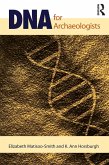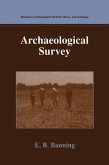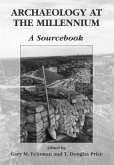Using feedback from students and teachers who have been using the first edition, as well as another ten years of personal experience with the text, the author has provided an updated and revised second edition with a number of important changes. New topics covered include: -Proportions and Densities -Error Ranges for Medians -Resampling Approaches -Residuals from Regression -Point Sampling -Multivariate Analysis -Similarity Measures -Multidimensional Scaling -Principal Components Analysis -Cluster Analysis
Those already familiar with the clear and useful format of Statistics for Archaeologists will find this new edition a welcome update, and the new sections will make this seminal textbook an indispensible resource for a whole new group of students, professors, and practitioners.
Praise for the first edition:
"Robert Drennan has done the field a great service." Larry R. Kimball, American Antiquity, Vol 62 (1997).
"There is a great deal to recommend this book.... It is written in an engaging style...and it is consistently focused on the practical problems of archaeological analysis." Robert E. Dewar, SAS Bulletin, July 1997.
"...this book is highly recommended." Gary Lock, American Journal of Archaeology, Vol 101 (1997).
"I will use this book when I teach statistics in the future, and I will gladly recommend it to others." Randall McGuire, Historical Archaeology, Vol 32 (1998).
"an excellent introductory textbook ...introducing complex ideas on statistics to students in a practical, non-threatening way.... [It] will help us to train our students to be better consumers of the statistical analyses they must deal with throughout their careers." Mark Aldendorfer, Journal of Field Archaeology, Vol 25 (1998).
Dieser Download kann aus rechtlichen Gründen nur mit Rechnungsadresse in A, B, BG, CY, CZ, D, DK, EW, E, FIN, F, GR, HR, H, IRL, I, LT, L, LR, M, NL, PL, P, R, S, SLO, SK ausgeliefert werden.
"Statistics is often perceived as something mysterious and hostile, and this holds particularly true for archaeologists... The merit of Drennan's work is that he takes readers by the hand and gently guides them through that minefield, etting them discover that statistics can be a matter easily approached and understood from a commonsense perspective...Fourteen years after the first edition, a number of important new topics are added. They provide the reader with useful tools to explore archaeological data as the data becomes progressively multivariate...Each section uses the same case study and data set, thus enhancing the comparability of this technique...Drennan successfully conveys complex concepts in smple ways...both students and scholars will surely welcome this gentle introduction to statistics, wherein simplicity does not detract from scientific precision" -- Gianmarco Alberti, American Journal of Archaeology, 114.4, 2010
"this is a superb book, setting the use of basic statistics in a format that makes sense of the formulas rather than just saying "compute this". Mathematically fluent students who scorn a specific context will complain that there is too much "talky talky" surrounding the formulas. That talk, missing from many applied elementary statistics, is especially what the audience for this book needs and deserves, and rarely gets in class, in my experience...Robert Drennan [has]...succeeded where others have failed, namely to explain, in an understandable way, the advantages of simple statistical techniques in a specific applied context. I heartily recommend this title." -- Norman R. Draper, International Statistical Review, 79.1, 2011
Praise for the first edition:
"Robert Drennan has done the field a great service." -- Larry R. Kimball, American Antiquity, Vol 62 1997
"There is a great deal to recommend this book.... It is written in an engaging style...and it is consistently focused on the practical problems of archaeological analysis." -- Robert E. Dewar, SAS Bulletin, July 1997
"...this book is highly recommended." -- Gary Lock, American Journal of Archaeology, Vol 101 1997
"I will use this book when I teach statistics in the future, and I will gladly recommend it to others." -- Randall McGuire, Historical Archaeology, Vol 32 1998
"an excellent introductory textbook ...introducing complex ideas on statistics to students in a practical, non-threatening way.... [It] will help us to train our students to be better consumers of the statistical analyses they must deal with throughout their careers." -- Mark Aldendorfer, Journal of Field Archaeology, Vol 25 1998
"Robert Drennan has done the field a great service." -- American Antiquity
"Statistics for Archaeologists effectively integrates both traditional statistical methods and more recent techniques of exploratory data analysis (EDA)...One of the major strengths of this book is its emphasis on sampling...Drennan has produced a usable and insightful statistics text." -- Journal of Field Archaeology, 1998
"Statistics is often perceived as something mysterious and hostile, and this holds particularly true for archaeologists... The merit of Drennan's work is that he takes readers by the hand and gently guides them through that minefield, etting them discover that statistics can be a matter easily approached and understood from a commonsense perspective...Fourteen years after the first edition, a number of important new topics are added. They provide the reader with useful tools to explore archaeological data as the data becomes progressively multivariate...Each section uses the same case study and data set, thus enhancing the comparability of this technique...Drennan successfully conveys complex concepts in smple ways...both students and scholars will surely welcome this gentle introduction to statistics, wherein simplicity does not detract from scientific precision". (Gianmarco Alberti, American Journal of Archaeology, 114.4, 2010).
"thisis a superb book, setting the use of basic statistics in a format that makes sense of the formulas rather than just saying "compute this". Mathematically fluent students who scorn a specific context will complain that there is too much "talky talky" surrounding the formulas. That talk, missing from many applied elementary statistics, is especially what the audience for this book needs and deserves, and rarely gets in class, in my experience...Robert Drennan [has]...succeeded where others have failed, namely to explain, in an understandable way, the advantages of simple statistical techniques in a specific applied context. I heartily recommend this title." (Norman R. Draper, International Statistical Review, 79.1, 2011).
Praise for the first edition:
"Robert Drennan has done the field a great service." (Larry R. Kimball, American Antiquity, Vol 62 (1997)
"There is a great deal to recommend this book.... It is written in an engaging style...and it is consistently focused on the practical problems of archaeological analysis." (Robert E. Dewar, SAS Bulletin, July 1997)
"...this book is highly recommended." (Gary Lock, American Journal of Archaeology, Vol 101 (1997)
"I will use this book when I teach statistics in the future, and I will gladly recommend it to others." (Randall McGuire, Historical Archaeology, Vol 32 (1998)
"an excellent introductory textbook ...introducing complex ideas on statistics to students in a practical, non-threatening way.... [It] will help us to train our students to be better consumers of the statistical analyses they must deal with throughout their careers." (Mark Aldendorfer, Journal of Field Archaeology, Vol 25 (1998)
"Robert Drennan has done the field a great service." (American Antiquity)
"Statistics for Archaeologists effectively integrates both traditional statistical methods and more recent techniques of exploratory data analysis (EDA)...One of the major strengths of this book is its emphasis on sampling...Drennan has produced a usable and insightful statistics text." (Journal of Field Archaeology, 1998)

